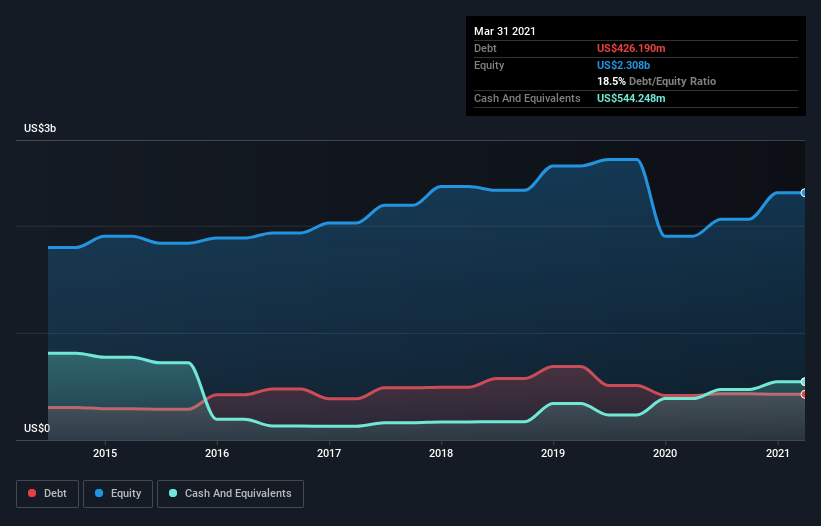- Hong Kong
- /
- Auto Components
- /
- SEHK:179
Does Johnson Electric Holdings (HKG:179) Have A Healthy Balance Sheet?

Warren Buffett famously said, 'Volatility is far from synonymous with risk.' It's only natural to consider a company's balance sheet when you examine how risky it is, since debt is often involved when a business collapses. Importantly, Johnson Electric Holdings Limited (HKG:179) does carry debt. But is this debt a concern to shareholders?
When Is Debt Dangerous?
Debt and other liabilities become risky for a business when it cannot easily fulfill those obligations, either with free cash flow or by raising capital at an attractive price. In the worst case scenario, a company can go bankrupt if it cannot pay its creditors. However, a more common (but still painful) scenario is that it has to raise new equity capital at a low price, thus permanently diluting shareholders. Of course, plenty of companies use debt to fund growth, without any negative consequences. The first thing to do when considering how much debt a business uses is to look at its cash and debt together.
Check out our latest analysis for Johnson Electric Holdings
What Is Johnson Electric Holdings's Debt?
As you can see below, Johnson Electric Holdings had US$426.2m of debt, at March 2021, which is about the same as the year before. You can click the chart for greater detail. However, its balance sheet shows it holds US$544.2m in cash, so it actually has US$118.1m net cash.

A Look At Johnson Electric Holdings' Liabilities
We can see from the most recent balance sheet that Johnson Electric Holdings had liabilities of US$959.3m falling due within a year, and liabilities of US$751.1m due beyond that. Offsetting this, it had US$544.2m in cash and US$654.2m in receivables that were due within 12 months. So it has liabilities totalling US$511.9m more than its cash and near-term receivables, combined.
While this might seem like a lot, it is not so bad since Johnson Electric Holdings has a market capitalization of US$2.39b, and so it could probably strengthen its balance sheet by raising capital if it needed to. However, it is still worthwhile taking a close look at its ability to pay off debt. While it does have liabilities worth noting, Johnson Electric Holdings also has more cash than debt, so we're pretty confident it can manage its debt safely.
Another good sign is that Johnson Electric Holdings has been able to increase its EBIT by 25% in twelve months, making it easier to pay down debt. The balance sheet is clearly the area to focus on when you are analysing debt. But it is future earnings, more than anything, that will determine Johnson Electric Holdings's ability to maintain a healthy balance sheet going forward. So if you want to see what the professionals think, you might find this free report on analyst profit forecasts to be interesting.
But our final consideration is also important, because a company cannot pay debt with paper profits; it needs cold hard cash. While Johnson Electric Holdings has net cash on its balance sheet, it's still worth taking a look at its ability to convert earnings before interest and tax (EBIT) to free cash flow, to help us understand how quickly it is building (or eroding) that cash balance. During the last three years, Johnson Electric Holdings produced sturdy free cash flow equating to 67% of its EBIT, about what we'd expect. This cold hard cash means it can reduce its debt when it wants to.
Summing up
Although Johnson Electric Holdings's balance sheet isn't particularly strong, due to the total liabilities, it is clearly positive to see that it has net cash of US$118.1m. And it impressed us with its EBIT growth of 25% over the last year. So is Johnson Electric Holdings's debt a risk? It doesn't seem so to us. There's no doubt that we learn most about debt from the balance sheet. But ultimately, every company can contain risks that exist outside of the balance sheet. Case in point: We've spotted 1 warning sign for Johnson Electric Holdings you should be aware of.
At the end of the day, it's often better to focus on companies that are free from net debt. You can access our special list of such companies (all with a track record of profit growth). It's free.
When trading stocks or any other investment, use the platform considered by many to be the Professional's Gateway to the Worlds Market, Interactive Brokers. You get the lowest-cost* trading on stocks, options, futures, forex, bonds and funds worldwide from a single integrated account. Promoted
New: Manage All Your Stock Portfolios in One Place
We've created the ultimate portfolio companion for stock investors, and it's free.
• Connect an unlimited number of Portfolios and see your total in one currency
• Be alerted to new Warning Signs or Risks via email or mobile
• Track the Fair Value of your stocks
This article by Simply Wall St is general in nature. It does not constitute a recommendation to buy or sell any stock, and does not take account of your objectives, or your financial situation. We aim to bring you long-term focused analysis driven by fundamental data. Note that our analysis may not factor in the latest price-sensitive company announcements or qualitative material. Simply Wall St has no position in any stocks mentioned.
*Interactive Brokers Rated Lowest Cost Broker by StockBrokers.com Annual Online Review 2020
Have feedback on this article? Concerned about the content? Get in touch with us directly. Alternatively, email editorial-team (at) simplywallst.com.
About SEHK:179
Johnson Electric Holdings
An investment holding company, engages in the manufacture and sale of motion systems worldwide.
Flawless balance sheet, undervalued and pays a dividend.
Similar Companies
Market Insights
Community Narratives




